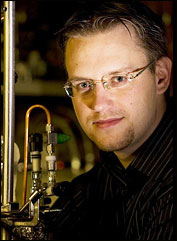Cary Pint’s lab – Nanomaterials and Energy Devices Laboratory in Olin Hall – is close to completion and it brings to Vanderbilt its first two atomic layer deposition (ALD) systems, relatively small tools that deposit atomically thin layers of material on virtually any surface.
The lab also houses a host of tools for new carbon and non-carbon fabrication, and the ability to test materials for a diverse number of applications.

“With these systems we can engineer structures at nanometer or sub-nanometer resolution to design new materials for energy storage devices,” said Pint, assistant professor of mechanical engineering.
Pint has joined the Vanderbilt engineering faculty from Intel Labs in Santa Clara, Calif., where he was a research scientist in the Extreme Technology Research Group. Pint earned a Ph.D. in applied physics from Rice University and he served as a postdoctoral fellow in the electrical engineering department at the University of California, Berkeley.
Pint’s research focuses on new types of energy storage with uses that could range from nanocircuitry to grid-scale applications.
One project involves developing supercapacitors for creating fast-charging batteries. “If you can reduce phone charging from two hours to two minutes that might come in handy in an airport,” Pint said.
Pint approaches energy storage from two vectors: energy built into materials and energy systems to replace fossil fuels. “Imagine designing multifunctional materials. A table is designed to hold a load, but imagine a table built from material that also stores energy.”
Pint also is working on developing batteries that store over 10 times more energy than current lithium-ion technology and could replace fossil fuels in automobiles and aerospace vehicles. “Our group focuses on all aspects of using energy storage as a bridge to sustaining and enabling new technology and supporting the integration of renewables, including wind and solar, into the power grid.”
Pint’s other research interest is energy conversion. He collaborates with his wife, Rizia Bardhan, a new faculty member in chemical and biomolecular engineering, on solar energy conversion processes. Pint and Bardhan both appeared in Forbes’ 2012 30-under-30 list of rising stars of science where Pint was cited for his work on solid-state energy storage.